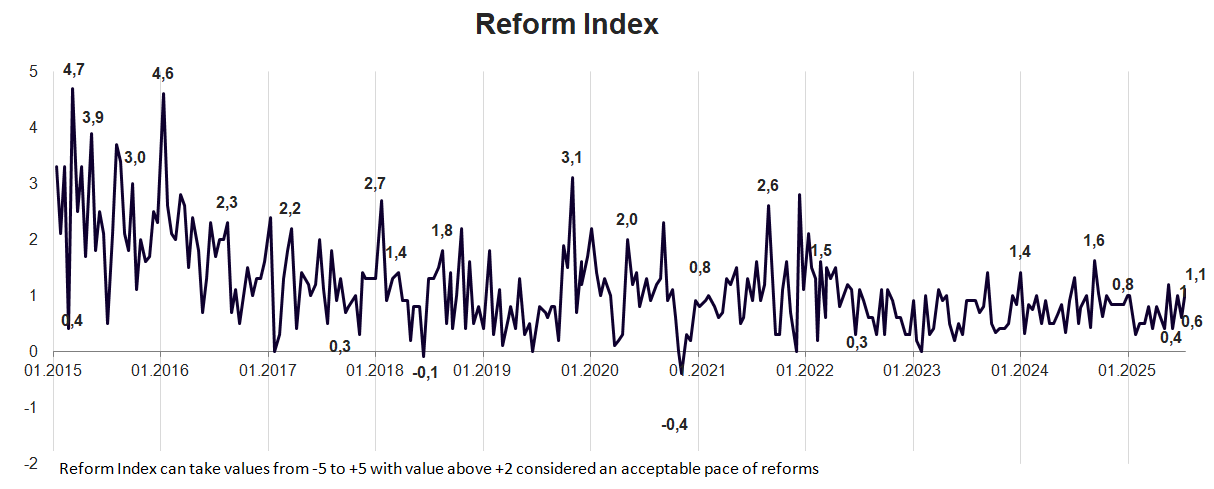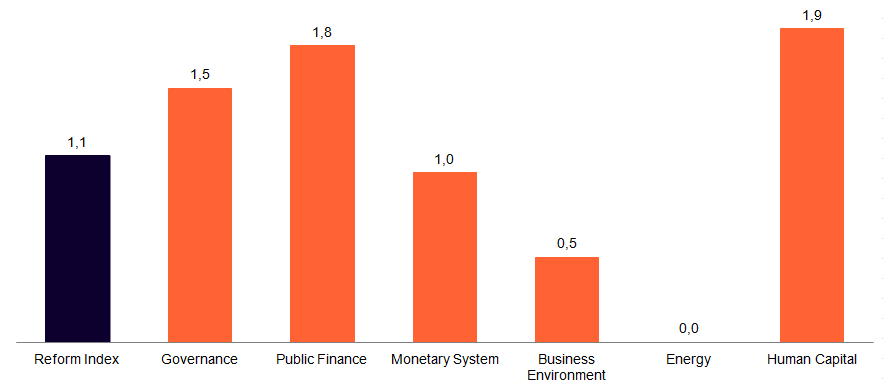The beginning of July was rich in reforms: between June 30 and July 13, Reform Index experts recorded 14 reform measures and one counter-reform.
A negative score (-0.5 points) was given to a Cabinet resolution that set out the procedure for transferring places of worship to religious organizations for free use. All other resolutions received positive assessments. The main reform of this issue is the law establishing the Unified Register of Service Members, which received +2 points on a scale from -5 to +5. The overall score of the Index in issue 268 is 1.1 points, up from +0.6 points in the previous issue.
Graph 1. Dynamics of the Reform Index

Graph 2. Values of the Reform Index and its Components in the Current Assessment Round

Law on the Unified Register of Service Members, +2 points
Ukraine will establish the Unified State Register of Service Members — an information system designed to collect data on service members. Initially, it will include data on personnel of the Armed Forces of Ukraine and the State Special Transport Service, and over time, it is expected to cover all branches of the Defense Forces. The Register will contain personal information (surname, first name, and patronymic, date of birth, gender, tax identification number, or passport series and number for those without a tax ID), as well as data on military registration documents and the electronic identifier Military ID.
Military ID is a digital code assigned to a person for the entire duration of their service. It is intended to ensure that service members’ personal data (such as passport or tax identification numbers) is not used across different government systems and registers. Instead, all processes — from recordkeeping to information verification — will be carried out via Military ID.
Data from the Register will be integrated with other Ministry of Defense systems, including the Oberih system and medical records: results of medical examinations, including fitness for service, will be sent directly to the Register from healthcare facilities.
After discharge, a service member’s data will remain in the system until they reach the maximum age of military service, and in the case of death — for 25 years. If the person transfers to another military formation, such as the Security Service or intelligence, their data will be removed from the Register upon request of the relevant body.
Information about the Reforms Index project, the list of Index experts and the database of the regulations assessed are available here.
Expert commentary
Anton Revenko, attorney, head of the military service program at the NGO Legal Hundred:
“The Law of Ukraine No.4497-IX provides for creating the State Register of Service Members. This information and communication system is designed for collecting, storing, accumulating, updating, recording, processing, protecting, anonymizing, and ensuring the uniqueness of records on service members of the Armed Forces of Ukraine and the State Special Transport Service. The Ministry of Defense is the holder of the Register. The information entered into the Register of Service Members is restricted and not subject to disclosure.
Among the new features and advantages:
- Introduction of Military ID — a unique electronic identifier that enables data exchange between registries without using personal data;
- Electronic military ID card — integrated into the Army+ app to digitally confirm service, benefits, subsidies, and more;
- Development of digital services, in particular the Army+ platform for providing e-services to military members and their families, as well as integration with the state services portal in the field of security and defense;
- Medical data, including results of fitness-for-service examinations, will be transmitted automatically from healthcare systems.
Among the risks:
- Possibility of cyber-espionage and data leaks: a centralized database on service members during wartime is a potential target for cyberattacks and poses a threat to the safety and lives of service members and their families;
- Technical complexity, as it is necessary to develop reliable software for storing and transmitting large volumes of personal data.
In our view, Law No.4497 is quite a progressive step toward digitalizing the defense and social spheres, as it aims to create a foundation for modern military recordkeeping, increase management efficiency, and improve access to social guarantees. At the same time, it requires careful oversight of implementation, especially with regard to protecting personal data.”
Transfer of houses of worship to religious organizations for use free of charge, -0.5 points
On July 7, 2025, the Cabinet of Ministers adopted Resolution No.854, establishing a mechanism for transferring state- and municipally-owned houses of worship — churches, religious complexes, and the like — for free use by religious organizations. From now on, religious organizations may apply to regional administrations or local self-government bodies to request a house of worship for free use. The lists of houses of worship available for transfer will be published on the official websites of regional administrations or local self-government bodies.
The transfer of such a property must be approved by the State Service for Ethnopolitics and Freedom of Conscience (SSEFC). Before granting approval, SSEFC verifies that the applicant is not affiliated with sanctioned entities. A response on approval must be provided within 20 days. If no decision is issued within that period, the transfer is deemed automatically approved. Additional approval is required from the Ministry of Culture or local cultural heritage protection authorities for cultural heritage landmarks.
A transfer may be denied if the owning authority needs the property for its own purposes, in particular if a house of worship has been repurposed after reconstruction. A refusal will also be issued if the property is already leased, if SSEFC objects, or if the intended use of the building is contrary to the law.
In the event of a positive decision, a loan-for-use agreement is concluded for a term of up to 10 years. The agreement prohibits subleasing the property and obliges the tenant to maintain it. Local self-government bodies may conduct periodic inspections to verify whether tenants comply with the agreement’s terms.
Expert commentary
Ilona Sologoub, scientific editor at Vox Ukraine:
“According to Resolution No. 854 of July 7, 2025, regional or city administrations, or local self-government bodies, must publish on their websites information about available houses of worship and restrictions on their use. A religious organization submits an application to receive such a building for free use under a loan-for-use agreement. The transfer of a house of worship must be approved by the State Service for Ethics and Freedom of Conscience (which verifies whether the religious organization has ties to Russia). If the building is a cultural landmark, additional approval is required from the Ministry of Culture or the relevant local administration department.
In practice, the representative of the authority that manages the building makes the decision on granting it to a religious organization at their own discretion, since the criteria described in the resolution (equal treatment of all religious organizations, investment of funds into the building, the presence of other centers of a given religion in the city or region) are vaguely formulated, and their consideration is only advisory. Thus, on the one hand, this creates opportunities for religious organizations to exert corrupt influence on officials. On the other hand, these officials will likely be reluctant to provide detailed justifications for their decisions (which the resolution also requires), in order not to create grounds for appeal. Even more difficulties arise when two or more religious organizations want to use the same property — in that case, the official must determine the order of use.
Therefore, the resolution is difficult to implement and carries corruption risks. Unsurprisingly, it received a negative assessment. A more effective approach would be to lease these buildings through auctions, as is done with other state or municipal property. Conditions could include restrictions on the use of the buildings and a requirement to have no ties to Russia. Such an auction process would be far more straightforward and transparent, while also generating revenue for local or state budgets.”
Reform Index from VoxUkraine aims to provide a comprehensive assessment of reform efforts by Ukraine’s authorities. The Index is based on expert assessments of changes in the regulatory environment in six areas: Governance, Public Finance, Monetary system, Business Environment, Energy, Human Capital. Information about the Reforms Index project, the list of Index experts and the database of the regulations assessed are available here.
Attention
The author doesn`t work for, consult to, own shares in or receive funding from any company or organization that would benefit from this article, and have no relevant affiliations



